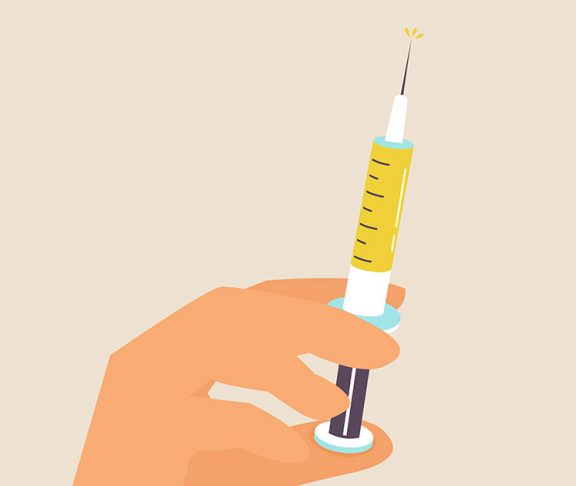
Victor DiRita, Ph.D.
Rudolph Hugh Endowed Chair in Microbial Pathogenesis, Michigan State University, President, American Society for Microbiology
As the United States heads into flu season in the midst of the coronavirus pandemic, persistent myths about vaccines continue to threaten public health and safety.
This year, flu season in the United States is accompanied by the ongoing COVID-19 pandemic, which experts worry will impact health outcomes for both illnesses. But there is some good news. Measures we should all be observing to minimize the spread of COVID-19, including mask-wearing, social distancing, and frequent hand washing, will likely limit flu transmission as well. Another piece of good news is that we have vaccines to protect us from influenza. Unfortunately, after decades in which vaccines have saved countless lives, vaccine hesitancy is emerging as a major issue, leading to increasing cases of vaccine-preventable diseases.
Flu vaccines have been proven safe and effective. But with so much conflicting information from such a wide variety of sources, it can be difficult to sort out misconceptions based on half-truths and rumors from facts derived from solid research. Many people become confused and question the value and safety of vaccination.
Debunking bad science
Regarding vaccine safety, false claims not supported by scientific evidence have led to fears that vaccines could trigger an adverse health outcome. One such example comes from a 1998 paper associating the measles, mumps, rubella (MMR) vaccine with autism. This paper was later retracted after numerous flaws were discovered in the way the research was carried out. Several large-scale studies have since disproven this association, but the original research paper led to a dangerous reduction in the rate of vaccine coverage.
Another recurring theme in vaccine hesitation relates to additives in vaccine preparations, which are imagined to be harmful. Two commonly cited additives are thimerosal, a mercury-based compound used as a flu vaccine preservative, and alum, an aluminum-based mixture that enhances the body’s immune response to the vaccine, but fears about these compounds are unfounded.
The amount of thimerosal present in the flu vaccine is rapidly metabolized in the body and is not toxic to humans, and in any event, thimerosal has not been used in childhood vaccines for nearly 20 years. While alum is present in very low levels in vaccine preparations, the aluminum amounts are less than what we absorb from the air, food, and cosmetic products.
A matter of public health
Just as public health measures taken to slow the spread of the COVID-19 virus prevent not only ourselves but the people around us from getting sick, flu vaccinations help vulnerable populations from contracting the illness. Harmful myths about the safety of vaccines put entire communities at risk — not just individuals.
Being vaccinated lessens your likelihood of contracting the flu and reduces the severity of symptoms if you are infected. And when you are vaccinated, you are much less likely transmit the flu to those who cannot get vaccinated, such as immune-deficient individuals and those with allergies to vaccine components. So, getting your yearly flu vaccine is a key action you can take to ensure a safe and healthy community.
Checking sources
It is crucial to focus on credible sources when consuming any scientific information. There are plenty of falsehoods, misconceptions, and rumors about vaccines floating around the internet. But there are also many reliable sources conveying facts based on rigorous science. Agencies such as the Centers for Disease Control (CDC) and the Food and Drug Administration (FDA), along with organizations such as the World Health Organization (WHO) provide solid information coming from experimental evidence. Societies like the American Society for Microbiology also provide reliable information for the public, vetted by doctors, researchers and microbiology professionals.
With correct knowledge, you can become an informed advocate and help others understand the facts about life-saving health interventions such as vaccines.


